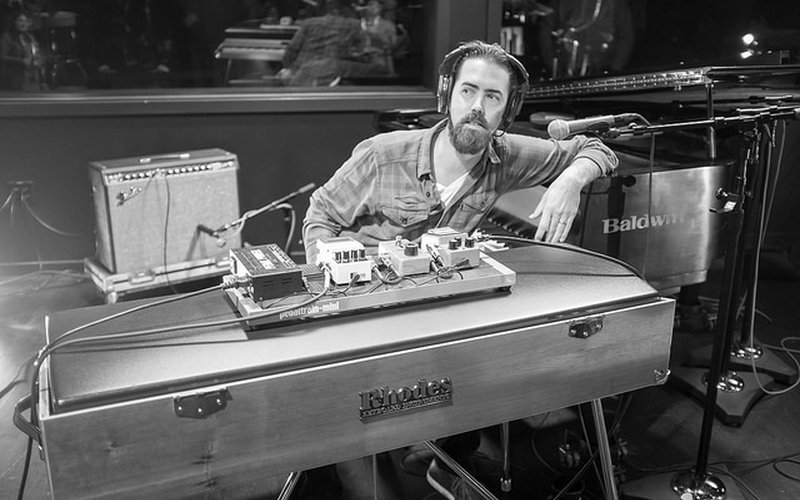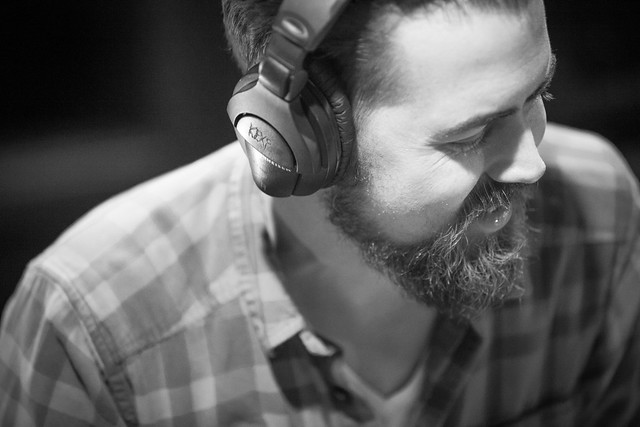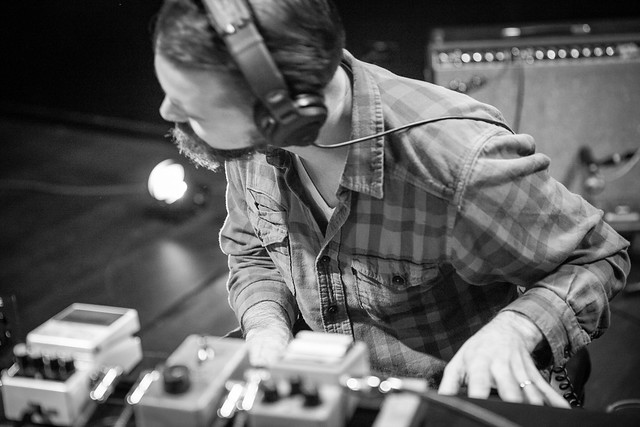
From a patio overlooking the foothills of the Cascade Mountains near Leavenworth, WA, Seattle musician, Josh Rawlings, prepares himself for a month-long writing session with famed Seattle music producer, Ryan Lewis. Rawlings, who has toured with the golden-voiced Allen Stone and is one-fourth of the award-winning neo-jazz band, Industrial Revelation, has grown into a coveted keys player ever since graduating from Cornish College of the Arts and earning his stripes playing “The Hang” jam at Lo-Fi. Known for his skill and acumen on the Fender Rhodes, Rawlings’ keys work can be heard all over Macklemore and Ryan Lewis’ This Unruly Mess I’ve Made, among many other projects, and he is the main in-house piano player for Lewis as the producer’s career continues to grow and reinvent. As music writers stream in and out of the Leavenworth musical Batcave, we had a chance to catch up with Rawlings and ask him about his journey and how he got where he is today.
When did you first touch a piano?
I first started playing the black-and-whites when I was three years old. I got a keyboard that Christmas that I still have to this day. It’s amazing that it still works -- a Yamaha Portasound, which has a drum machine on it. I sometimes say my first musical influence that I can really recall was Mozart because the demo button the keyboard played a really cheesy, synthy version of the “Bum, bumbum, bumbumbum bumbum bum” song. I pretended back in the day like I was playing that. I just loved it. Not for the demo button, but for all the things it could do. I could go into my own world, make beats, play sounds. It was pretty advanced for a small toy keyboard. My parents would say I started loving music when I was in the womb, though. I’d kick to the music at the concerts they’d bring me to when my mom was still pregnant. And as soon as I could grab, I was banging sticks on pots and pans.
When did you first play a Fender Rhodes?
At a jam session in Belltown during my freshman year at Cornish College of the Arts. I was invited down to play with the house band at this Vietnamese restaurant on the corner of 2nd and Wall -- it’s not there anymore. The guy leading it was this trumpet player who pops in and out of town. That’s where I met D’Vonne [Lewis, drummer in Industrial Revelation]. The house band was loose, a lot of the same players came each week but we rotated quite a bit. The trumpet player had a Fender Rhodes and he’d bring it -- it was great to show up and not have to bring any equipment. But when I first played it, it made a deep connection. I couldn’t believe how the sound and the instrument felt under my fingertips.
What did your days playing “The Hang” at Lo-Fi with your trio, The Teaching, some ten years ago embed that you lean on today?
The Hang started roughly after I graduated from Cornish, in 2006, or so. By that time, I was playing with bassist Evan Flory-Barnes and various other jazz players. Industrial Revelation had already formed -- and that band certainly set a new trajectory where I felt all this headier jazz music that I was playing toward the end of college morphed into more music that I was gravitating toward naturally, like Robert Glasper, A Tribe Called Quest, Jill Scott, J. Dilla. But I particularly feel Robert Glasper and Industrial Revelation at that time became catalysts for me saying to myself, ‘You have the freedom to do this type of music.’ And that really blew my mind.
The Hang was a continuation of exploring that sound, that boom-bap, that very free-flowing hip-hop, soulful or neosoul-type of music. We were hitting a spot that I felt was so good. Evan had the opportunity at Lo-Fi to curate a night; the owners wanted him to have a weekly. The Teaching had also just formed but our drummer, Jeremy Jones, went on a yoga training retreat for a couple of months so we had different drummers rotate in. It took a little time for the word to get out, but once it did, we felt we had something special. It drew poets, emcees, break dancers, people that just wanted to listen, singers, horn players. As the local [but east coast-born] rapper, Spekulation, put it, he said it felt like the time in Philadelphia when the Roots were coming up. Tapping into something raw like that in the early days was special.
When you play live, you offer such joy and so much expression. But often in your studio work, the sound can be more somber. What attributes do you think help you play with range?
When I’m standing -- or surfing my piano bench -- some have likened it to something Jerry Lee Lewis would do. But, for me, it feels very organic. And I know it gets cats hyped when they see me physically get excited. It comes out the most with Industrial Revelation. I feel like I’m rocking out and I don’t want to be seated. I want to get up and feel like I could do a flip over this keyboard.
But in terms of the range, I never really thought deeply about it other than the reference I have to a wide range of musical influences. Classical music was never in my wheelhouse, for example, but I can play elements of it because I’ve studied the technique on the piano. I spent two years studying classical piano with private teachers during my degree program at Cornish so I could approach the piano -- jazz can be clunky and too rhythmic -- and I wanted to feel like I could pour my emotion out through the piano that way, too.
There’s something innate with the connection I have to the instrument that I feel I’ve had my whole life. I just get in the zone and get in the vibe with whatever’s being created. Whether it’s something in the studio with Ryan Lewis or a rock-out, distortion pedal session with Industrial Revelation. I try to bring myself to every situation. And it comes from the musical influences in my life -- from Billy Joel to Nirvana and Pearl Jam, who I listened to at a young age. Later, I began listening to electronic music, techno, and dance music, which brought me down the rabbit hole of acid jazz and bands like Portishead. And I’d say this is the same with all my bandmates in Industrial Revelation -- we all have that same philosophy. Evan references everything from Bach to Kanye. There’s such a wide range. We try to listen with huge ears and big hearts.

Ryan Lewis called you the greatest studio piano player in Seattle. What is your approach to working in studio?
When I enter the studio, I’m just kind of like feeling the vibe. I’m trying to make myself as chameleon-like as possible. Ryan will throw a sample -- or whomever I’m working with -- and I’ll be working to make myself seem like I’ve been playing with these guys or playing to this sample for years.
Like, over the last few days, we set up this epic, five or six synths, grand piano, Moogs, Nords, all sorts of stuff. It was just a jam. But everything was separate in the board, so while we all played together and it was beautiful, everything could be separated and taken down piece by piece. There’s something magical about that. It brought me back to going to Guitar Center, listening to what other people in the room were playing and secretly jamming with them. You listen to the different sounds. I’m going in and improvising everything I do, trying to be as honest and connected to whatever is needed in the moment. I think Ryan identified early on in my piano playing my malleability. That I could be adaptable. And this also happens on the bandstand with Industrial Revelation. I’ll get something in my ear and I’ll just go for it. I feel supported by my bandmates even in this whole new thing we’ve never explored musically on stage. I can thank my jazz chops for making me ready to take on any situation.
What does Industrial Revelation -- specifically the live aspect -- do for your creative spirit that studio work doesn’t?
That group, in particular, allows me to feel like I’m doing my gym sessions. I’m getting my work in. I know that no matter what the gig is or the situation, I’m bench-pressing with my brothers. I’m putting in the time -- not necessarily to work out ideas, but I get to go deep into it and put my energy and passion into every performance. It happens naturally.
The brotherhood and bond we’ve made through the years, we trust each other. No one really plays ideas or takes music in such a way that it feels out. Instead, it’s all done in this way that feels -- it’s just this beautiful group interplay. We’re creating the music together. There’s a level of being receptive and supportive and instigating ideas in a way that moves very freely. Unlike with, say, live shows with Ryan and Ben where everything’s done with a click and to a track. The songs with Industrial Revelation, even though they’re composed, we’re going to play them a little different, with a new twist that feels special.
Your dreams seem to be actually coming true. What does that feel like in real time?
It’s been a thing to digest, this whole new trajectory I’ve been on. On this recording session with Ryan, I’m up in the attic, the studio in the loft, and I see the trophy case and I’m staring at four Grammys. It’s surreal still. It’s surreal and I’m taking time to digest. But I try really hard to tell myself that I belong here. That this is what I’ve manifested.
I remember being around family and feeling like my family and friends knew I was a working musician. And there was this guy, Josh Ritter, who had [this great musical career] and I’m like, ‘This dude’s name is Josh and everything! I want to get where he is.’ There are always people you admire and look at. Like Herbie Hancock and that swing that Gene Harris brought to the piano. Before that, Billy Joel -- I had a picture of Billy Joel on my keyboard music stand growing up. Shortly after my wife and I had our first child, I went on tour with Allen Stone. I’d never been on a major tour across the country like that, sleeping on a bus. I thought maybe I would have to scale down, but instead, I just shifted to new things that have challenged me.
You’ve traveled the world on the skill of your piano playing but you’re also a parent to three children. How has your idea of family changed over the last five years?
My son, Leo, was six months old when I first got the call from Ryan Lewis and Ben. I was in the car and Leo was crying. When I got to the studio, Ben was like, ‘Man, I got mad props for anyone that can have a business phone call while having a screaming kid in the background.’ I was nervous, I knew they were successful but they hadn’t blown up yet. I felt embarrassed, trying to schedule this studio time with my son crying.
But for me, family has been a really great anchor. I can see my experience touring with Allen Stone and getting a taste of playing in front of thousands of people with Ben and Ryan in Germany. That lifestyle can be enticing. You want to do what you love and do it for the most amount of people as possible. It’s been a dream of mine to travel the world with my music. And getting a taste of that has made me feel like I’ve achieved a dream on one level, but I know that it’s also a grind.
Everything has its pros and cons, but that lifestyle traveling around with a tour bus, the drugs, the intense lifestyle, I feel like family kept me anchored through it and reminded me what I’m actually working on and working for. There’s something also to having received writing credits on Macklemore and Ryan Lewis’ This Unruly Mess I’ve Made. I think, ‘Wow maybe we can buy a house one day, maybe I can have something to pass on to my children.’ It feels very gratifying.

If every musical memory in your life were put into a photo album, which picture would you want on the cover?
The immediate one that popped into my head as I went into my little mental archives was me sitting at the piano and playing the alma mater that I co-wrote with my theater teacher in high school. Sitting at the grand piano in front of the whole school in the gym, overcoming my fear of playing in front of people. Facing that fear. Feeling like a human but knowing this is what I love. I remember that moment being a tipping point and starting to get comfortable with the idea of being a professional musician.
Another thing that pops into my head is a picture of me sitting at a grand piano for the Allen Stone tour. I got the lucky opportunity of playing at Red Rocks in Colorado, which is a beautiful amphitheater. And I was bringing my son’s stuffed fox with me and taking pictures for a book called Foxworth’s Musical Adventures. And there’s one picture of me sitting at the grand piano and Foxworth sitting there with me. It was so silly but it brought me joy even though my heart was longing to be with my family.
How has your idea of your own self changed over the past 20 years as you’ve continued to make music?
I think it’s just been a level of getting really comfortable in my own skin like I think any human goes through. If I think back, 20 years ago I was a sophomore in high school, I’m really kind of the same person. I loved getting together with other musical people to jam, goof off, go to Guitar Center. You know, I was thinking the other day about this guy whose dad had Microsoft stock and I used to play with him. He had all these cool toys and we were making techno music and beats and having a great time. And I’m really just doing the same thing now. But I’ve just acquired more skills. I’ve invested in the craft and that brought a level of comfort and trust in myself. I’m still working through a lot of self-doubt, like the first time I went into a writing session with Ryan Lewis in Los Angeles. It was exciting and scary at the same time. But to get it to a little nugget or a concept, I think the idea of myself has just become more trusting. I’m going to put my heart into whatever it is I’m doing, just like I did when I was a young kid. But in a way, I’ve gotten more Zen. I just let go and trust the process.
When Darto's Nick Merz was 21 years old, he found himself crossing a bridge. Not a metaphorical bridge, but a literal one. As he walked with his friend, the man gave him some sobering criticism.
Northwest music and northwest beer -- it's hard to imagine a better pairing. This Saturday, you'll be treated to some of the best of both as KEXP and Rainier Beer team up once again for the annual R-Day celebration. KEXP's The Morning Show DJ John Richards will be on site hosting the event with per…
Throwaway Style is a weekly column dedicated to examining all aspects of the Northwest music scene. Whether it’s a new artist making waves, headlines affecting local talent, or reflecting on some of the music that’s been a foundation in our region; this space celebrates everything happening in the …
During the recording process of Phantogram's third album, Three, members Sarah Barthel and Josh Carter experienced a devastating loss. Barthel's sister and Carter's close friend Becky died by suicide. While the electro-pop duo has always explored dark themes in their songwriting, they weren't prepa…